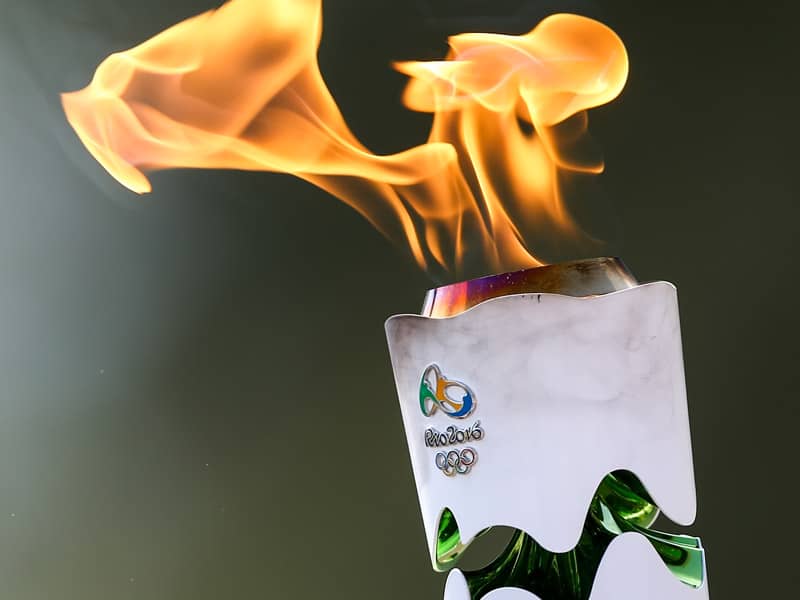
When the Olympics come around many of us are glued to our TVs, watching until we’re bleary-eyed rooting for our team, feeling every emotion, from joy to crushing defeat. Why is watching the Olympic games so addictive? A good part of it has nothing to do with sports at all, but with the stories: The “up close and personal” stories of struggle and strength, of overcoming injury and hardship, of fighting back and fighting through. Stories of people who not only represent the pinnacle of athleticism, but also of redemption and lessons of faith in the most competitive of circumstances.
These stories of athleticism, training and competitiveness go all the way back to ancient times. The apostle Paul used illustrations from the world of athletics in several of his letters. In three Epistles, he used the image of all-out racing to urge vigorous and lawful pursuit of spiritual growth and service. Four times Paul spoke of his own growth and service in terms of his own such race.
To the gifted but immature believers in Corinth, Paul wrote, “Do you not know that in a race all the runners run, but only one gets the prize? Run in such a way to get the prize” (1 Corinthians 9:24). Here, Paul compares the disciplined effort necessary for spiritual growth to an Olympic athlete’s effort to win the prize that awaits only the winner of a race. Growing Christlikeness doesn’t happen on its own. God certainly works in you to will and to act in order to fulfill His good purpose” (Philippians 2:13), but the believer must cooperate with God by exerting responsible and serious effort to follow what the Holy Spirit teaches. “Anyone who competes as an athlete doesn’t receive the victor’s crown expect by competing according to the rules” (2 Timothy 2:5). For the disciplined believer, the prize is the “upward call of God in Christ Jesus” (Philippians 3:14). To what does God call the believer? It is to become like Jesus Christ in heart and lifestyle (Romans 8:28-30).
A professional athlete in training endures all sorts of tests on the road to competing in the Olympics. In a similar way, the true believer demonstrates the reality of God’s work in his heart by enduring all sorts of tests in the development of Christlikeness. The believer is in training, much as an Olympic athlete must train for a race. No pain, no gain. That is why the writer of Hebrews exhorted, “Let us throw off everything that hinders and the sin that so easily entangles. And let us run with perseverance the race marked out for us, fixing our eyes on Jesus, the pioneer and perfecter of faith. For the joy set before Him He endured the cross, scorning its shame, and sat down at the right hand of the thrown of God. Consider Him who endured such opposition from sinners, so that you will not grow weary and lose heart” (Hebrews 12:1-3). Jesus is portrayed as the finest runner, who set the pace, our model and hero in life’s race. Just as the runner in the Olympics must dispense with anything that would hinder his running, we must disentangle ourselves from sin. As a runner in the games must keep his eyes on the finish line, so we must keep our eyes on Christ and His joyful reward.
Another passage in which Paul uses the metaphor of a race is Galatians 2:1-2. There Paul tells how he had visited Christian leaders in Jerusalem in order to check with them the Gospel he preached to the Gentiles. What was his reason for taking such care? “For fear that I was running or had run my own race in vain.” It was vital to Paul that he knew, believed and taught God’s truth. This was the way that he “ran his race.” It was in peaceful confidence that Paul approached the end of his life. Anticipating his impending martyrdom in Rome, he wrote to his young protégé, Timothy: “The time for my departure is near. I have fought the good fight. I have finished the race. I have kept the faith; Now there is in store for me the crown of righteousness, which the Lord, the righteous Judge, will award to me on that day – and not only me, but also to all who have longed for his appearing” (2 Timothy 4:6-8).
Two other things we can learn from the Olympics, specifically Olympic athletes is how to handle disappointment and the benefits of reaching goals. It goes without saying that from time to time in sports and in life, we will be disappointed. The opposing team (and sometimes even our teammates) accomplish more, we accomplish less than we want, we feel cheated, and sometimes we let our ambition get the best of us. It might take some time and a bit more than a pep talk, but we can always bounce back.
Scripture reminds us “Do you not know that in a race all the runners run, but only one receives the prize? So run that you may obtain it. Every athlete exercises self-control in all things. They do it to receive a perishable wreath, but we can imperishable. So I do not run aimlessly, I do not box as one beating the air. But I discipline my body and keep it under control, lest after preaching to others I myself should be disqualified” (1 Corinthians 9:24-27).
When an athlete is first training and makes a goal for the first time, the sense of accomplishment will feed them all the way to the final games. In our Christian life, we will definitely have goals. It’s important that we push ourselves to reach those goals so that we can be stronger disciples of our faith.
An athlete must train, know the rules and commit to winning. A believer must endure hardship, exercise absolute and enduring faith in the Word of God, and keep His eyes on the goal. In the power of the cross, the believer grows more and more like the Savior. Despite obstacles, challenges, temptations and even the threat of death, the Christian continues to run the race Christ has marked out for him. The Olympics teach us that we can accomplish anything when we trust in our God-given abilities and keep the faith, even when we’re tested. The road may be difficult but the payoff is well worth it.

